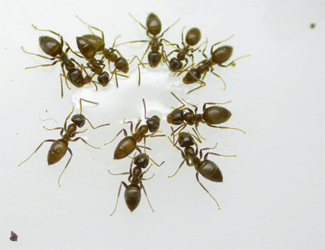Invading ants

Lasius neglectus is an ant species in which some of its populations may be considered as invasive or, at least, have been denounced as urban pests. It is a peculiar species that lacks a proper mating flight and swarming has never been observed. Mating occurs, apparently, within the nest. The dispersal of mated queens is, therefore, rather different from what is usually known in other ants. In this species the colony expands slowly and at short distances by a mechanism known as "budding". The newly mated queen, with an unknown number of workers, leaves the nest and travels a short distance to begin a new colony. This way of slow colony expansion leads to the formation of supercolonies, in which aggression is totally absent within its limits. Alternatively, portions of a colony may be transported through human traffic and commerce of goods, plant material or soil movement. The supposed centre of origin of this species is Turkey.
We analyzed: a) the local expansion rate at a short time scale (less than 20 years) in four populations (three from Hungary, one from Spain), and b) the regional pattern by collecting all known data and looking at the collection date and interpopulation distances. Results are straightforward: this ant species uses both processes to expand colony limits and reach new territories. The local expansion rate is of some 30 meters per year (mean of four supercolonies). The regional pattern shows that localities are distant a mean of 88 km (nearest neighbour measure; n=77 localities). One population, found at the Canary Islands, is an obvious example of unintentional transport by humans. Local expansion rates are 2 to 5 orders of magnitude smaller than long distance jump-dispersal distances.
Although the species was described in 1990, through the study of private or public collections in which older samples were detected, we could propose a model of the expansion process in time. Thus, according to available data from 77 localities, in the last 30 years this species has reached 14 countries, roughly a new country every two years. See more detailed information at: www.creaf.uab.es/xeg/Lasius/Ingles/index.htm
References
"Regional trends and preliminary results on the local expansion rate in the invasive garden ant, Lasius neglectus (Hymenoptera, Formicidae)". X. Espadaler, A. Tartally, R. Schultz, B. Seifert, Cs. Nagy. INSECTES SOCIAUX 54:293-301. AUGUST 2007.

